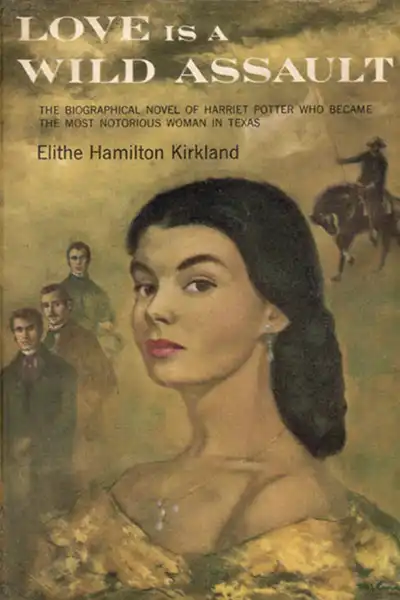
The Rest of the Story
Of all the individuals who appear in the pages of Texian Exodus: The Runaway Scrape and Its Enduring Legacy, Harriet Page Potter is among the most fascinating —and certainly one of its saddest. The book’s narrative describes her early life, her time in New Orleans, her disastrous marriage to Soloman C. Page, the birth of their two children, their immigration to Mexican Texas, Page’s abandonment of his young family, her “rescue” by Robert Potter, and the death of her infant daughter on Galveston Island. I leave her stranded on that dolorous stretch of sand because her life after the Great Skedaddle falls outside the scope of the volume. Even so, I expect there were readers who were disappointed that I did not complete her story. If you fall into that category, this blog is for you.
Harriet, one of history’s worst judges of male character, remained with Colonel Potter. By September 1836, they were living as man and wife, even though she had never secured a divorce from Page. Mrs. Page did not worry overmuch about that, since Potter–who was, after all, an attorney–persuaded her that her first marriage was invalid, at least in Texas, since a Roman Catholic priest had not sanctified it. This was a claim of dubious validity. Only then did she agree to his proposal.
The nuptials were more than a little casual. A bond joined them. In those days, it was a document guaranteeing that no legal bar existed to prevent marriage, but it was not an actual marriage contract. Potter, a lawyer, would have known that; Harriet, ignorant of the legal niceties, would not have. Nevertheless, she began to call herself “Mrs. Potter,” and both the colonel and the community recognized her as such. She continued to live as Potter’s wife and bore him two offspring while living on Caddo Lake at “Potter’s Point.”
Subsequently, Potter won election as senator in the Congress of the Texas Republic. He served in that body from November 2, 1840, until his death. True to his belligerent nature, he became embroiled in the so-called “Regulator-Moderator War” in Harrison County. It was not an actual war but rather one of the bloodiest and bitterest feuds in Texas history. The leader of the Moderator faction, Potter became a target of the Regulators. On March 2, 1842, a gang of Regulators attacked his home and shot him to death as he was attempting to escape by swimming across Caddo Lake. Yet, the Regulators, true to the prevailing code, made no effort to harm Harriet or her children.
It was only after Potter’s death that Harriet learned the full extent of his deceit. When officials probated his will, it divulged that he had left the Potter’s Point homestead to his Austin mistress, Sophia Mayfield. He did bequeath Harriet a portion of the headright, slaves, horses, furniture, and farm animals. Yet, in an act that was to have calamitous consequences, the will consistently refer to Harriet as “Mrs. Harriet A. Page.” The inference was that he had considered her his live-in mistress, not his legal wife.
In 1852, Sophia Mayfield—the “other woman’—died without ever having attempted to lay claim to Potter’s Point. Nevertheless, the administrator of her estate sold the rights to a third party. In 1857, the purchasers filed a suit against Harriet and her third husband, Charles Ames. The courts reluctantly ruled against Harriet and Ames. Under the law as it then existed, there was little else they could do. The decision hinged on Potter’s failure to reference a wife or children among his beneficiaries.
Forced out of the home Harriet she and Potter had built together, she spent her declining years living with the children of her third marriage in New Orleans. At eighty-three years of age, she wrote her memoirs, which Elithe Hamilton Kirkland employed to write her highly fictionalized account, Love is a Wild Assault, published in 1959. Harriet spent her final years entirely deaf and isolated from her family. On March 18, 1902, this much-victimized woman died in Covington, Louisiana, at the age of ninety-two She deserved far better from this life than she received.
At the time, Texas citizens were so outraged by the injustice of the court’s decision that they demanded–and received–legal reforms. As a result, Texas now enjoys extremely liberal laws concerning legal marriages. Common-law marriage (also known as marriage without formalities or informal marriage) is a valid and legal way for a couple to marry. Texas law states that one may prove common marriage by providing evidence that the couple:
“agreed to be married”; and
“after the agreement they lived together in this state as husband and wife”; and they
“represented to others that they were married.”
(I quote the above language directly from the Texas statutes.)
Of course, these reforms came too late to assist Harriet Potter, but she would smile knowing that no Texas woman would ever again endure the suffering she had at the hands of a brute–and a misogynistic legal system.
Order Texian Exodus: The Runaway Scrape and It’s Enduring Legacy from Amazon now.
